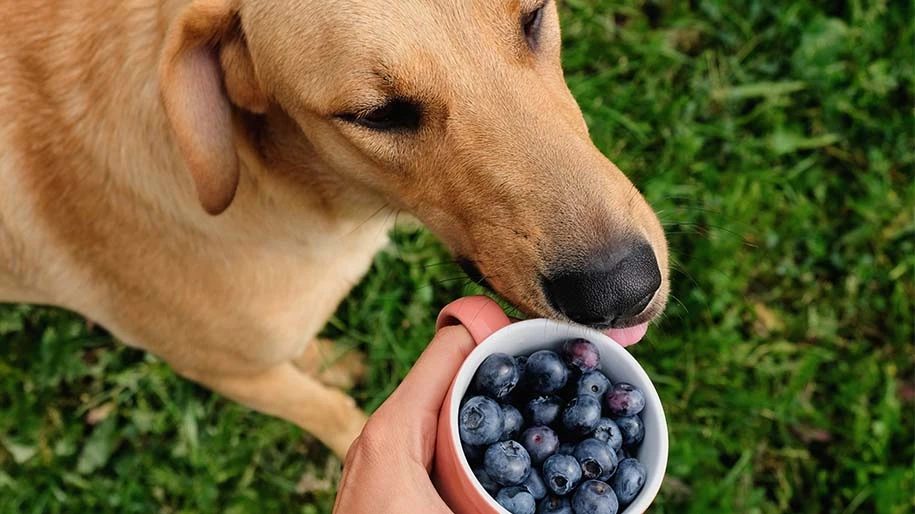PET HEALTH
Blueberries probably look like a tasty snack to your dog, and you may be tempted to share some with your four-legged friend. You know there are some human foods you should never give your dog, but what about blueberries? Are blueberries toxic to dogs? Let's set the record straight.
Are Blueberries Good for Dogs?
Yes, your dog can eat blueberries. Humans derive plenty of health benefits from blueberries, and many of them could extend to your dog as well, in moderation.
Researchers believe blueberries are high in antioxidants. These antioxidants are substances that help neutralize free radicals that can damage cells. Most people know antioxidants by other names, such as vitamin C, vitamin E, or beta-carotene.3
For people, these vitamins may help protect against heart disease, cancer, and other diseases. They may also help your dog in the same way along with other potential benefits, according to researchers who have studied the effects of diets rich in antioxidants in dogs.4 Some benefits your dog might derive from blueberries include:
● Support eye health and respiratory function
● Restore balance in your dog’s body
● Support for a healthy immune system
How To Feed Blueberries to Your Dog
There are several ways you can feed blueberries to your dog, and you can also find many recipes for special treats online.
You can give your dog fresh, frozen, or dried blueberries, but fresh, uncooked blueberries generally give the most benefits. Make sure you avoid any canned blueberries to avoid the extra sugar — you should never give your dog anything with artificial sugars, which can be toxic to them.
When you want to give your dog blueberries, try giving them as a treat. A healthy, low-calorie blueberry can make a great reward for good behavior. If you want to spruce up your dog's dinner, add a few fresh or dried blueberries for an extra twist.
Keep food safety in mind.
Some blueberries may be sprayed with chemicals, such as pesticides. These can be harmful to your dog, so make sure you wash the blueberries well before you give them to your dog. To clean blueberries, place them in a colander and dip them in cold water. While the colander is in the water, swish it around to better clean the blueberries.
Blueberries can also be a choking hazard, especially if they’re frozen. A lot depends on the size of your dog, but it's always a good idea to keep an eye on them as they snack.
How many blueberries can my dog eat?
When it comes to how many blueberries your dog can eat, you have to consider a couple of factors: first, the size of your pup. A smaller one probably should have no more than five to 10 blueberries a day. Larger dogs can have more. However, blueberries and treats should not account for more than 10% of your dog’s diet.5
Can my dog have blueberries every day?
The short answer is yes, but it comes with a word of caution: You don't want to feed your dog too many blueberries because it can lead to loose stools. There’s also a risk of weight gain with too many calories. As always, check with your dog's veterinarian beforehand.
Can my dog have blueberry muffins?
While the blueberries in the muffin may be good for your dog, some of the other ingredients in it may not be. Sugar, for example, can cause many health problems for your dog, including weight gain, cavities, and diabetes. Skip sharing the blueberry muffin with Fido.
Can my dog have blueberry yogurt?
Your dog should not have yogurt that contains additives, which include sugars and artificial coloring. Plain, unsweetened yogurt with fresh or frozen blueberries mixed in may be OK in moderation. Many dogs have trouble digesting dairy, though, so you'll need to keep an eye on them.
In Short, Your Dog Can Have Blueberries
Are blueberries good for dogs? Yes! They provide many health benefits and are an easy treat to give to your dog, but you need to make sure you're giving them in moderation. It's important to remember that not all foods are safe for your dog, and some can be dangerous. If you think your dog ate something they shouldn't have, call your veterinarian right away.

